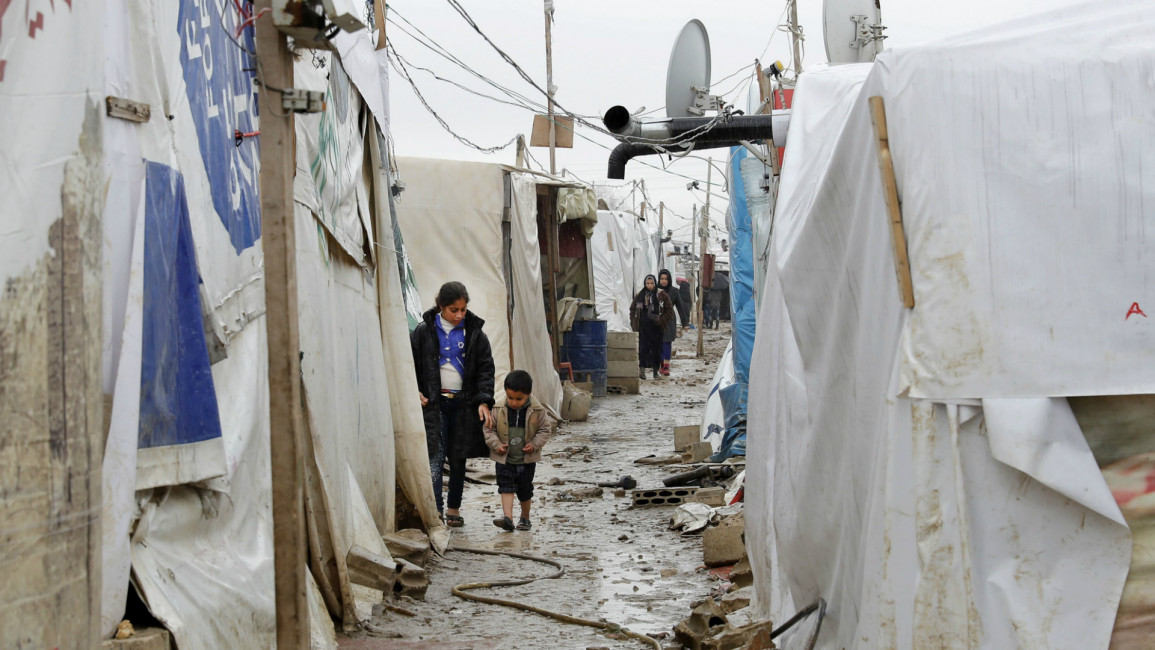Exclusive: Hizballah seeking Syria 'safe-zones' to resettle Lebanon refugees
Hizballah, in cooperation with the Syrian regime, is looking to establish a "safe zone" inside Syria, according to information obtained from Syrian and Lebanese sources by The New Arab's Lebanon-based correspondent Abdul-Rahman Orabi.
This comes amid calls made by recently elected US President Donald Trump for similar safe zones, to halt migration from the region into Europe.
The planned safe zone would be established in the Qalamoun region in the western parts of Syria's Homs province, close to the Lebanese border and Hizballah's powerbases in the Bekaa valley.
Lebanese President Michel Aoun, a political ally of Hizballah, is said to approve of the scheme keen to alleviate Lebanon from purported socio-political and economic hardships brought about by the influx of more than 1 million Syrian refugees into the country.
Plans for the safe zone are said to already be underway, with Hizballah and Syrian regime officials in negotiations with opposition factions based in Qalamoun over a "reconciliation deal".
According to the provisional terms of the agreement, rebels' service within a policing unit – to be created and overseen by Hizballah and Assad forces and titled the "Saraya Ahl al-Sham" – will be considered, granting those who join its ranks exemption from armed service.
A general amnesty for rebel fighters from the region, many of whom are currently based in refugee camps over the border in Lebanon is also being considered while Hizballah has requested a number of villages in the area are excluded from the safe zone agreement, namely al-Nabak, Deir Atiyeh, Qastal, and Maaloula.
Additional points in the provisional agreement include stipulations identifying the Saraya Ahl al-Sham as responsible for appointing local administrative committees in towns under the deal, and establishing local police forces, with a committee of Hizballah notables overseeing such developments but playing no military role within the safe zone.
Hizballah is identified as the "guarantor" of the agreement with border crossings from Lebanon’s Bekaa valley into Qalamoun set to be re-opened with the exception of in the restive border town of Arsal.
 |
New identity documents for all returning refugees lacking supporting identification documents are also set to be issued, under the terms of the new agreement. |  |
New identity documents for all returning refugees lacking supporting identification documents are also set to be issued, under the terms of the provisional agreement.
In addition to providing Lebanon relief from an endemic refugee problem that has exacerbated resource shortages and created socio-political schisms within the country, the agreement would also help secure Hizballah's military supply lines linking the Bekaa valley with Damascus, while further securing the Iran-backed group's influence within Syrian territory.
According to local sources in Lebanon's Bekaa valley who spoke to The New Arab, the first processes of the agreement are already underway with censuses of Syrian refugees from Qalamoun, and other towns in Homs, being conducted in the border town of Arsal, and the surrounding area where over 100,000 refugees are thought to be based.
A meeting is said to have taken place on Wednesday between Lebanese and Syrian security figures to discuss the potential of opening up border crossings into Homs province from Lebanon.
However, the potential agreement remains in its infancy.
Speaking to The New Arab, Moayan Merabi, Lebanon's Minister for issues related to Syrian refugees, said that Lebanon was keen to alleviate burdens caused by the influx of refugees into the country.
However he said that Syrians were only likely to return if their security could be guaranteed adding that any coordination between Lebanon and the Syrian regime on the issue would have to be coordinated by the two states' General Security apparatuses.



